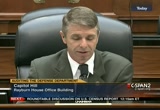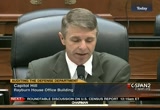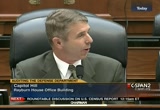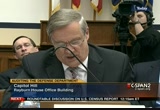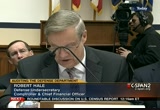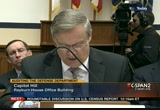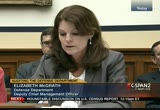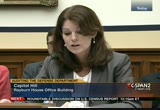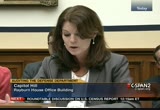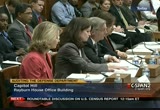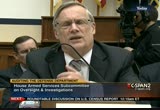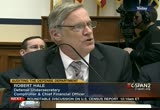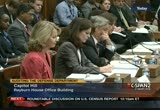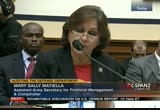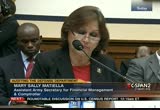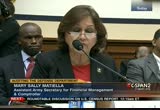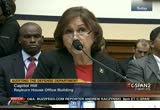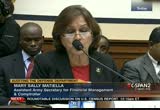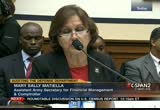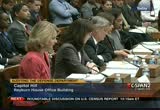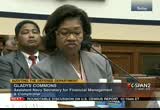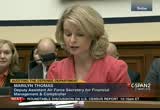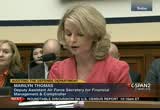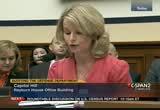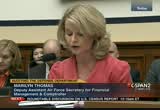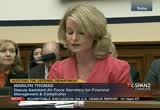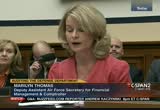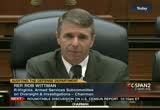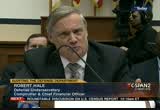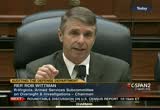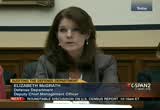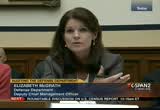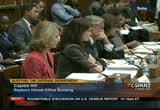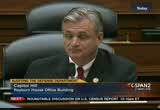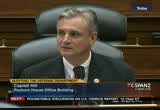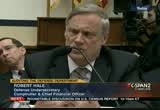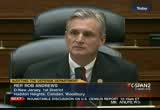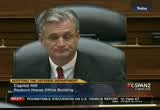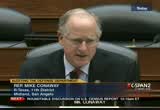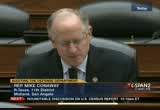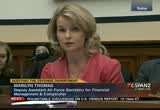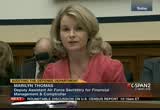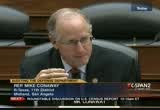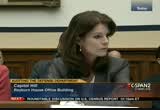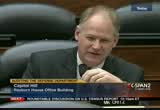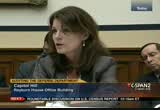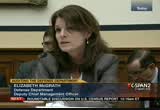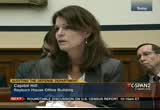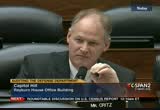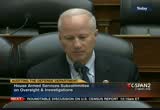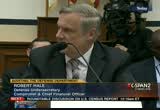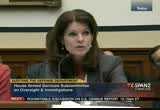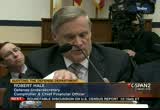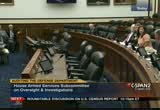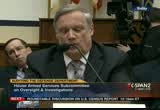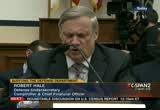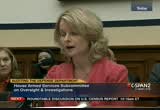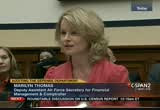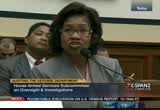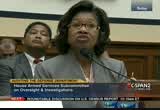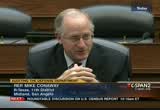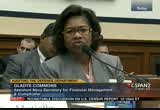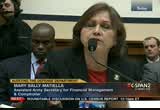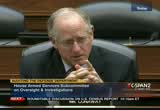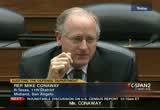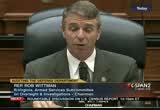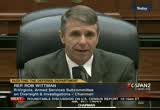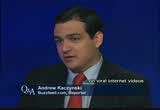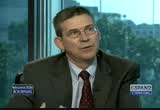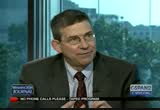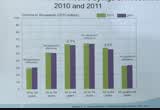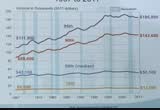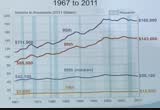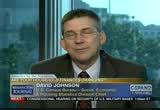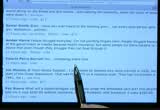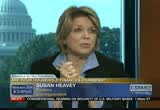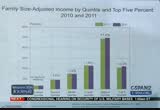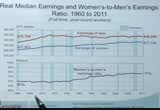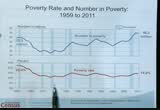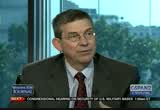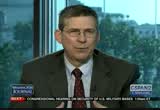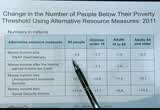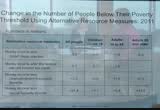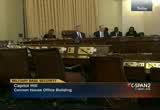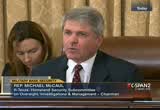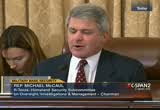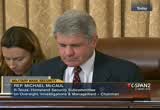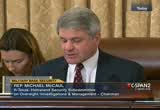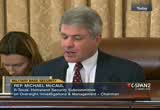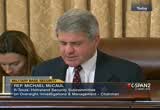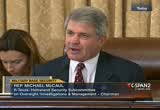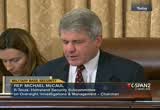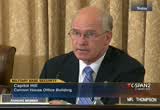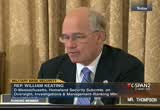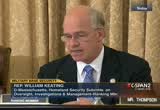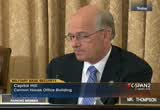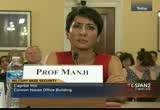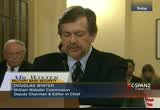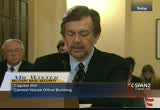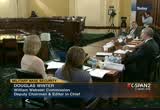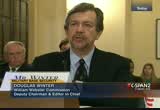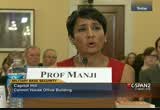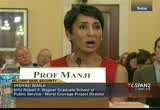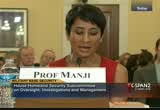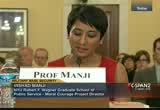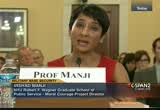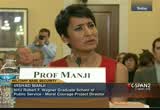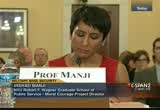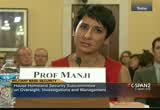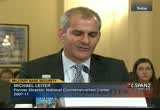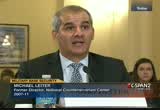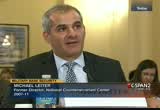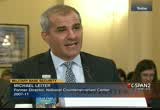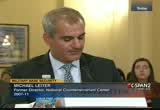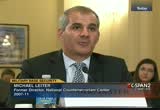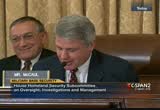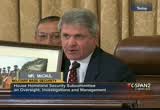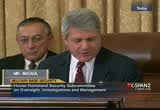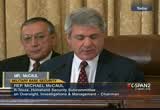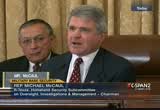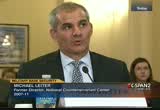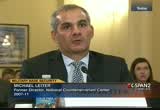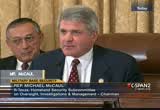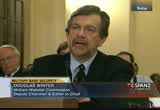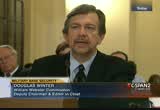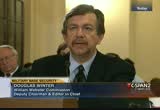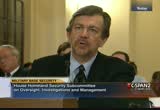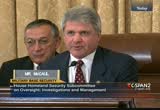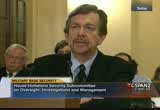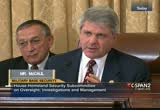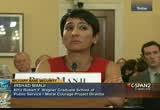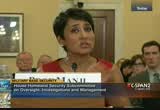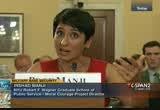tv Capital News Today CSPAN September 14, 2012 11:00pm-2:00am EDT
11:00 pm
is complex and challenging, and it's clear you are making tangible progress forward. this is met as a follow-up to the defense financial management and audittability reform panel which was appointed by the chairman to carry out a comprehensive review of the department's management system. the purpose of the review was to oversee the financial system and capacity for providing timely, reliable, and useful information needed for making accurate decision making in reporting. i thank the cn of the panel and mr. andrews who was the ranking member. because of your efforts and outstanding leadership, we have a much better understanding of the issues surrounding audit readiness in the path that lies ahead. it's important for many reasons, but for me, it's important
11:01 pm
because of what it means for the national defense strategy. every dollar we corral matters especially because of impending cuts and financial restraints. the budget shapes not only our discussions on force, size, structure, and capability, and ultimately determines whether the war fighters have the tools and equipments they need to do their jobs. this is the prism through which i view discussions about audit readiness and why i'm pleased to be having this discussion today. before we get started with questions, i have a quick administrative manner to address. i anticipate a number of other members from other subcommittees will join us, and i want unanimous concept they be allowedded to participate. as so ordered, and i recognize the members at the appropriate times for five minutes after all oversight investigation subcommittee members had the opportunity to question the witnesses. at this point, i will turn to our agenting ranking member,
11:02 pm
mr. crist, for any statements he may have. >> thank you, mr. chairman. i do not have an opening statement other than to say thank you for being here and as we all know, accurate information is critical to making the best decisions so i look forward to the hearing and your testimony. >> very good. thank you. >> at this point, turning to the panel members for your opening statements. ms. thomas, we'll begin with you. >> thank you, chairman. >> ms. thomas, go ahead and pull your microphone up to you. >> mr. chairman, if i may, if it's okay with you, i think the order we prefer is giving overview from the department's stand point and go to the services, will that work for you? >> that's fantastic, yes, yes. we'll do that jointly. >> okay, very good. >> okay? >> okay. >> very good. >> mr. chairman, members of the committee, thank you for the opportunity to discuss the financial operations at the department of defense and our progress and audit readiness. we submitted a statement for the record in the interest of time,
11:03 pm
we will summarize it briefly. i'll begin by saying we remain fully committed to meeting the audit goals and we are confident we'll meet the goals in the time frames established by us and in some cases by the law. why is it important to do this to achieve audittability? it's important, first, because it is the law. it also matters because, as you said, mr. chairman, it helps us make better use of taxpayer resources. that's important, especially in these times of fiscal stress and declining budgets, but in my view, the most important reason we have to do this to achieve auditable financial statements is public confidence. i don't think we'll convince the american public or congress we're good stewards of the funds unless we pass an audit test. i should note that even though dod's financial statements are not auditable, we still know where we are spending taxpayer dollars. that's an important point. with rare exceptions, we pay our
11:04 pm
vendors on time and record transactions properly. if that was not the case, there would be problems of mission failure, but none of that is happening. our financial statements fail audit tests not because we don't know where the funds are spent, but because we can't document properly and quickly, and in some cases the internal controls are not sufficiently strong or consistent. these are problems we can and will fix. i believe we'll fix these problems because, and achieve auditable statements for a number of reasons. first, we have a workable plan focusing on the information we use to manage. we have everybody pulling in the same direction. we have a combination of short term goals and long term goals, a supportive government structure, dedicated funding, and $300 million to $400 million a year throughout the planning period, and secretary panetta
11:05 pm
who is committed to the effort. we have a marine corp. on the verge of an auditable budget statement for current resources, an a navy showing audittability for key weapons systems, and army and air force demonstrating progress in key areas, and defense agencies that are now all focusing on achieving auditable financial statements. the service financial managers with me today be describe effects in more detail. state of the art financial systems are critical, and for progress only area, turning to the deputy chief management officer, beth. >> good morning, like mr. hale, i appreciate your interest in the efforts of the military members and their families. our efforts to improve audit readiness are to improve across the department and we take steps to mature the business environment including better
11:06 pm
definition of our target environment utilizing business enterprise architecture. we continue to push hard on reengineering that addresses not only at the system level, but the appropriate end-to-end process so that system resides within. strategic planning and performance measurements continue to increase, and timely, investment management process that addresses both ip modernization and sustainment funding across the business enterprise. we accomplish this comprehensive management process through the legislation congress passed in section 9 of the 2012 national defense authorization act. the department's implementation change enabled an integrated government for the entire portfolio systems by the review board which is significant for us. the board reviews and certifies mapping, design, acquisition, development, modernization, all aspects of a project, and, again, how they fit into the broader business conversation, and in it, all systems in
11:07 pm
initiatives that are greater than $1 million across the set up which is virtually everything helping us make better investment decisions, but reenforces the relationship of the business environment to the specific systems investments and outcomes we want to achieve like audit readiness and accelerates the legacy systems. for example, in 2012, we retired 112 legacy systems, and -- sorry, 2011, and in 2012, the number's approaching 2 # 00, and we project at least 150 for 2013. our modernized systems environment include each of the departments and prized resource planning, erps, which will improve financial management and accounting operations and help with future audits. at present, each system is at a different stage of the life cycle, experiences challenges, certainly, from design to implementation, leading to cost and schedule overruns, but we
11:08 pm
are proactively addressing each one of the challenges like data conversion, business processers, reengineering, stablization of requirements, and the culture challenges implementing a new i.t. system. we are committed to the achieving and overcoming challenges, and it's important to also state that while we are experiencing challenges, we are also delivering capabilities. shorter repair cycle times, better visibility of our assets, refused interest penalties and better scheduling of maintenance activities. implementation over new business systems enable audits, but not by itself, however, it establishes a modern business environment we need to meet and sustain our goal of audit readiness. we recognize the amount of work that lies ahead and committed to a successful execution. >> systems are critical
11:09 pm
committed leadership. we have that, starting with secretary panetta, he did a video on this, i update him in the staff meetings, and despite challenges he faces, he shows interest and asks questions about the topic. we had a full support of the deputy director, our secretary, i should say, who is, of course, the department's chief management officer. we have the support of the service secretaries and chiefs of staff. they have all met on the topic, and i think relevant members of the civilian ses leaders, and, in short, i think we have commitment in the department, military and civilian, to take action. less than candid if i didn't say there were problems and challenges and not much time to face them, but we are addressing them. we are managing of the skills of the people, we have a program putting in place to do that as well as specific audit training. we got to implement
11:10 pm
comprehensive and meaningful and consistent financial controls which we don't always have, and we're taking a number of steps including getting the service audit agencies involved to try to do that. we've got a sustain the momentum during the upcoming changes in leadership which tend to occur regardless of what the outcome of presidential elections. we're grateful for the support that we've gotten from the congress, incoming the recommendation of the committee's financial improvement panel, and mr. andrews and other members. congressional attention is one effective means ensuring audit readiness is a high priority. there is another thing you can do to help. in recent years, we encountered unprecedented budgetary uncertainty including no fewer than four shut down drills which we planned in a long term continuing fiscal resolution in 2011, a time consuming unproductive planning effects. sometimes i think i plan for things i hope don't happen. we face the prospect of services
11:11 pm
committee questions -- sequestering, and dealing with the extraordinary action is sapping the time we could be spending on other times like audit readiness. the single biggest thing you could do to help me is return to an orderly budget process. closing by reiterating full commitment to the management goals in the department of defense including audit the. i take it seriously. i started in 1994 as and i'm still trying now. we owe it to you to do that. we owe it to the troops and the american taxpayers. mr. chairman, that commongrounds our joint opening statement, and i suggest army, navy, air force if that's okay with you. >> yes. >> yes. >> good morning. congressman whitman, members of the subcommittee, thank you for the sunt to testify today regarding the army's work to achieve financial statement audit readiness. i want to convey to you that the
11:12 pm
secretary mccue, general, and the under secretary, and i commit to improving financial management and becoming auditable. the army will assert audit readiness for financial statements by september 2017. as required by ndaa for fiscal year 2010. the efforts to increase financial accountability and achieve audit readiness go hand-in-hand with secretary mccue's call for a leaner, faster, and more adaptable army. a more agile army is only possible if we have timely, accurate, and reliable financial information to inform our resourcing decisions. we achievedded a milestone that supports our audit readiness and transportation objectives. on july 1 of this year, the army completed the scheduled
11:13 pm
deployments of the general fund business systems. this system is designed to comply with audit requirements. each day, more than 25,000 users are using the system across 28 army commands, component commands, and direct reporting units. of course, in an organization as large and complex as the army, a transformation that requires a change in the day-to-day business and a fundmental shift in our culture faces significant challenges. both houses of congress and the gao have been valuable partners in our transformation endeavors. the army's audit readiness strategy addresses each of these six concerns. leadership engagement, accountability, internal controls, competent work force, business architecture, and compliance.
11:14 pm
audit readiness is part of the army's campaign plan, and it is the top ten priorities. top leadership has communicated through memorandum and other means the critical nature of audit readiness across the enterprise and the intent to hold personnel accountable. military and civilian, for example, in april, the chief of staff sent in a message to all general officers informing them of the importance of audit readiness. also, we have greatly increased accountability and oversight by embedding audit readiness criteria in the annual performance plans of all executive civilians, and we are engaging commanders and holding them accountable for implementing effective and internal controls. building a competent work force requires comprehensive community cations and training efforts. in 2012 alone, we have trained
11:15 pm
more than 8,000 personnel across all business functions in audit principles and implementing the internal controls in the army business processes. we are using the army learning management system and online systems to broaden or reach cost effective manners enabling users to assess the training content within 24 hours a day. timely, i established the army financial management work force transformation working group to identify the required work force skills and staffing levels that will support our financial management transformation. we are strengthening internal controls to installation process and control assessments. corrective action implementation and control training, and at the end of june, we reached two major milestones that demonstrate how far we've come in implementing interim controls. first, we asserted audit
11:16 pm
readiness for nine processes at ten different install installations for the statement of budgetary resources. an independent auditor validates the assertion through three scr exams leading up to the secretary defense's mandate. the first exam in 2011 resulted in a qualified audit opinion. that was at three installations, that highlighted that the standardization of business processes across locations is in place. that is a major achievement for the army. the second sbr exam evalwaits the internal control environment. second, in june, the army asserted audit readiness for three missile programs, javelin, hellfire, and tow, which represents approximately 16% of the operating materials and supplies. the dodaig conducts exams to
11:17 pm
validate the assertion. for the remaining two challenges, we developed a well-defined business architecture enabling the system to better support army audit readiness octoberives. we are conducting assessments of the erps and the systems using the gao financial information systems control audit manual which provides the guidelines and audit follows when conducting a financial statement audit of a federal agency. i am confident that the army will fully support the army's audit readiness goals as independent auditors already confirmed that gfibs to be substantially compliant with mia and dod standard financial information structure. it is about 9 # -- 93% compliant. we achieved significant accomplishments in the last 12 months.
11:18 pm
we received a clean opinion on appropriations received. for exam one, we received a qualified opinion, and we have fully deployed the new accounting system. i recognize challenges we face, but i'm confident we are executing a sound plan that will achieve the ndaa2010 mandate. our plan is sufficiently resourced, and it has a full support of the army's top leadership and has resulted in successfully achieving several milestones to-date. i'm personally committed to the effort, and i look forward to working with the members of the subcommittee, gao, and the comptroller to ensure that the continued improvement of the army's business environment. thank you. >> thank you. >> good morning, mr. chairman, members of the committee, thank you for the opportunity to provide you an update on the
11:19 pm
work we are doing to achieve audit readiness. we appreciate your engagement and focus in the area. the department of the navy remains fully committed to achieving audit readiness within the time frames established by the secretary of defense and the congress. we have a detailed plan, and we believe we are on track to accomplish the goals necessary to achieve audit readiness. our financial management community, business process owners, and service providers working hand-in-hand to accomplish the task necessary to improve our business processes. in some cases, such as transportation of people, the business process owner at the senior executive level have taken the lead to examine the process and to ensure that the internal controls surrounding the business process are effective. they have demonstrated the
11:20 pm
functional ownership that we need by taking the initiative to implement the changes required for audit readiness, train the staff, and monitor sustainment efforts. the marine corp. continues under audit, and we are leveraging the lessons learned from their audit experience over the past two years. where they have implemented processes and procedures that need audit standards, we have incorporated them in our detailed plan for the entire department, and we share them with other departments and defense agencies. this year, we are focused on current year activities, and i am hopeful that we will receive a positive report in the december/january time frame. over the past year, the department asserted that a major defense acquisition program, the e2d2 program was audit ready.
11:21 pm
in july, a review by an independent public accounting firm validated the financial transactions associated with this program were accurate and that reasonable internal controls were in place. they issued an unqualified opinion. we have also received unqualified audit opinions on the existence and completeness of the majority of the military equipness. we have assessed our civilian personnel pay and travel processes, identified deficiencies in both the processes and the internal controls. we have remediated those defiesht sighs across the business enterprise, doesn'ted the process, and tested to ensure that changes have been made, and they are working effectively. we are now awaiting review by the independent public accounting firm which should
11:22 pm
begin within the next several weeks. we have examinedded all -- examined all of our business processes and completed one round of testing to identify any deficiencies that could preclude audit readiness. we are in the process of making the necessary changes to remediate those deficiencies. we are also examining the controls in the business systems to determine the systems changes required to meet audit standards. we will complete this fall a thorough assessment of the navy erp. the internal controls using the gao establishedded audit standards. the federal information systems controlled audit manual. i am pleased with the significant progress we have made. we have embraced audit readiness as an opportunity to improve our business processes, and to
11:23 pm
correct long standing issues that were not priorities in the past. however, achieving audit readiness is not without challenges. first, because our systems and processes were not designedded to achieve the standards demanded by a financial audit, changes are required to sustain our efforts. it will take time to implement all the necessary changes, but we are identifying and prioritizing those changes; particularly, the system changes to eliminate intensative manual work around. second, we know that our business process and internal controls need to be strengthened and enforced. we have identified the key controls required in each business process. the challenge is to make sure that the controls are implemented across the department, verify their
11:24 pm
effectiveness, and ensure through testing that they remain in place. third, we execute our resources across many organizations and activities generating millions of transactions. we rely on thousands of people inside the department of the navy and outside the department to perform segments of our business processes. these dependencies require nurturing, collaboration, consultation, close coordination, and monitoring to make sure we all remain in sync with the requirements for audit readiness. fourth, we operate in a decentralized manner gathering the evidentiary documentation required to support the millions of financial transactions we excute and heading that documentation readily available for audit review is a substantial effort. while these challenges are
11:25 pm
significant, we have have included in our detailed plan actions to address each of these challenges. in closing, i am encouraged by our forward momentum, the progress we have made, the relationships we have forged with our business process owners and providers, the support they are providing, and the experience and knowledge we have gained to-date; thus, i am cautiously optimistic we will meet our goals. i will be pleased to answer any questions you might have at the appropriate time. >> very good. thanks ms. commons. now to ms. thomas. >> thank you, chairman, and the mes of this panel -- members of this panel for the opportunity to testify today. first, let me start by confirming the air force's continued support of secretary panetta's accelerated goal of achieving audit readiness of the statement of budgetary resources by 2014 and for all financial
11:26 pm
statements by september 30th, 20 17. the air force is faithfully committed in obtaining the public's trust and stewardship of taxpayer dollars, and developing a culture that values efficiency and resource stewardship. we emphasize the importance of all income efforts, and all hands effort to successfully reach audit readiness by established deadlines. due to the dedicated professionals across the air force, we have made significant progress to-date; however, due to the enormity and complexity of the task before us, we view reaching the 2014 and 20 # -- 2017 goals as having hod -- moderate risk. before going into the challenges of reaching the goals, however,
11:27 pm
i want to share the progress we have made towards reaching audit readiness goals. within the last year, two independent opinions of previous assertions. in object, an independent public accounting firm issued a qualified opinion on the fund balance treasury reconciliation process. a process reconciling over 1.1 million transactions with an accuracy rate of 99.6%, exceeding the 98% recommended. in june, the dodig issued an unqualified opinion on our aerial target drones and cruise missiles valued at approximately 86 billion representing 14% of dod critical assets respectively. we have also completed two assertions of audit readiness for uninstalled missile motors and spare engines which, together, represent 6395 items
11:28 pm
valued at $11.5 billion. a dodig examination is underway for the effort, and we anticipate the final report in november. additionally, we submitted the $4 billion space based infrared radar system selected acquisition report assertion two months ahead of schedule and contract with an auditing firm this month to perform and independent examination and issue an opinion. in the process moving forward, we have made progress on end-to-end business processes and hiring additional contractors and organic resources with financial reporting and auditing expertise to allows to continue making headway on more assertions and reduce overall schedule risk. last august, for example, we earned an independent publicking thing firm uncalled opinion on
11:29 pm
budget authority distribution to the major commands. our complete and corrective actions on funds distribution to base so that we can assert audit readiness on that early next fall. we have also completed initial testing and corrective actions on reimbursable budget authority and civilian pay process allowing us to assert those two areas as audit ready in 2012. later this fall, we will kick off initial assertion testing for military pay and contracts. our preliminary assessments in both areas are very encouraging. despite the progress made to-date, we face many challenges. most significant of which is the need to improve our legacy information systems in order to support the 2014sbr assertion. with over 160 different systems recording, tracks, and reporting information for financial statements, the challenge is to identify, prioritize, and implement coast effective
11:30 pm
improvements to support the statement of budgetary resource assertion goal. the enterprise resource system, the defense enterprise account management system, otherwise known as deams, our next accounting system, and critical to be ready by 2017 had some challenges. recently, the air force operational test and evaluation center completed an operational assessment and highlighted concerns with the accounting accuracy and consistency, software development and testing and change management of our work force. we have corrective actions in place to address the issues, and we are doing preliminary testing , and i can tell you what i'm hearing is encouraging on that. we appreciate the pam's commitment and support to the air force audit readiness effort, and we look forward to achieving auditable financial
11:31 pm
statements. again, thank you for the hearing and allowing me to testify today. i look forward to your questions. >> thank you, thank you, panel members. we appreciate your efforts here, and i want to welcome mr. cooper and ask if he has any opening comments. >> i have no opening comments. >> okay. with that, we'll begin with the questions, and secretary hale, beginning with you and other panelists for their perspective. the senate recently passed a bill that includes a number of sanctions if a full scale clean audit is not achieved by september 20 # -- 20 # 17, and one removes the jurisdiction of the accounting service to the treasury. i wanted to get your perspective on that if you believe you avoid that or if you did get to that point, what the -- what your perspective would be on that to
11:32 pm
treasury. >> i think that transfer would be a bad idea. the goal is to reduce the oversight role, for me, because i do provide oversight over defense. it will have the opposite effect by increasing the workloadic because they are a day-to-day accounting firms. we need them working in the department of defense, but let me step back and comment on the pentagon agent briefly and broadly. we support the goals in the act, which is to get to audit readiness. you heard us all say that. we think we have a system of accountability. we are concerned about a number of the sanctions that are in there. you mentioned one. there are several others i can go into if they are of concern to us, and it's because there is some uncertainty here. some whether we'll make this, you know, we over promised and under delivered for years. i want to be honest with you. i'm reasonably confident, but i can't by absolutely sure for two
11:33 pm
broad reasons. one, as we finish discovery efforts, there may be problems that come up we didn't anticipate, and two, frankly, because of the uncertainty in the budgetary world i mentioned. we go through sequestering, that affects the resources and drains away an enormous amount of time. >> if you could pull the microphone up a light closer. >> is that better? >> yes, thank you. >> okay. bottom line, we support the goals of the pentagon act, we are concerned about some of the means. >> thank you. i wanted, also, to get your perspective, the dodig published a report to talk about some of the problems with enterprise planning systems, scheduled delays, cost overruns, and i wanted your perspective on what the root causes of those might be, what the plans are to overcome those to get things back on track. obviously, that's a critical element of long term success and
11:34 pm
being in the 2014 and 2017 milestones. >> if i may, i'd like ms. mcgrath to answer with the oversight there. >> okay. >> thank you. i think the reports highlight many areas that are the root causes, if you will, with regard to schedule and delay. you heard some of the -- in the opening statements, state some of the challenges. i mentioned in mine, you know, data conversion, change in management challenge, the training aspects, all of which we absolutely are taking action to ensure that one, we understand very acutely what the root cause was, and then the steps we have to take to correct those. i think for each program, there's a slightly different scenario, which is driving the schedule change, although, those are consistent, in particular, the data con vefertion and the -- data conversion and what we learned with the implementation
11:35 pm
of the solutions is that it can't just be the accounting team with the financial management solution. it must be the entire operation understanding the role that that capability plays within their overall execution, and that, to be honest with you, has been one of the most challenging. you heard that mentioned in the opening. you do you use the systems and capabilities to execute the business, and it does require a change in how we, you know, what we do every day. we must move away from, frankly, the years of practices that we've had into the new environment, and there are a lot more controls in the new systems. ..
11:36 pm
11:37 pm
the challenge on what the solutions are in the future. >> i am not really aware of a delay in payments within the department of the navy. we will deploy our system fully in october. we will go live on the first of october. i am not aware of any late payments. we are making the payments on time. and we are, in fact, moving more toward electronic payment so becomes a automated process. >> i will mark the question for the record. >> i will be happy to look into it. >> serve? i think my friend from iowa. i'm happy to be with you today.
11:38 pm
i appreciate the approach that chairman conaway has taken on the approach. we believe that we should audit the pentagon. introduce all those that you want. the hardware is the work you ladies and gentlemen have done. frankly, mr. conaway's laser beam focus on this for a number of years has really been the proximate cause of this. i would like to get into the progress we're that we're making in the problems we have found on the act of auditing. the first has to do with the problem of a beginning balance. obviously, to get a clean audit letter, you need to have an accurate beginning balance. this is a problem that you all inherited. you did not create. obviously if you have a history of no audits or centuries or
11:39 pm
decades, a good beginning balance is no easy thing. what steps are being taken to try to deal with this problem of the beginning balance? >> there are comments in particular that i would like to add. the problem is the way we do financial management at the department of defense, we go back 10 years or more. so we have five years budgeted for shipbuilding and we spend this amount of that amount of dollars. and we just don't have the records and we can get them quickly enough. that's another problem. that caused us to decide that for this year, the marine corps budget is we will focus on
11:40 pm
current resources. the plan is to build a documentation gradually as we move toward an audited effort. that will cause us to retain documentation so that a few years from now we will have ready access to it and better documentation. but it will take a while. >> let me say that i think he is leaning in the right direction. it is very important to know where the money stands, but it's also important and awareness. i think by focusing on the where it is question before the where it's been question, it's the right judgment. he really, you know, this is not a historical review. it's meant to be a useful tool for the present and future. the second question i want to ask was about the problem of software. giving us access usable data, and not as really the whole key issue doctor, did i pronounce
11:41 pm
your name right, i'm sorry. okay. i wanted to know what lessons we have learned thus far. it's only been since the first of july, right? >> correct. >> what did we learn in that period of time, what is working and what isn't, what lesson should we take? it is all about folks changing their practices. one of the ways that you approach change management you train and train and train. training becomes very important. one of the lessons that we learned at the very beginning of the people that we didn't train enough, in this you may have heard, some people needed more training. and then we pay for it.
11:42 pm
certainly, that was a big lesson for us is to be very mindful of training, help desk, online tools, providing all those different things. >> to what extent do you think that the training provides great things -- and how sort vendors? what is the quality provided by the vendors? >> the training provided is very good. we just need to continually reinforce it and reinforce it well. that is where our internal staff comes in. we have these super users, those are the folks that are reinforcing that training that was given. it is just one of those, it just has to be continuous. >> mr. chairman for midas also want to say personally and up close i have seen secretary leon panetta and ms. mckie and have worked tirelessly on this project. i know they are committed to overcoming obstacles and i'm
11:43 pm
proud i am proud of them and commend them for it. >> thank you, mr. andrews. we will now go to mr. conaway. >> thank you, mr. chairman. a couple of movies occurred to me when i walked in the room. one was the blues brothers, and the other one is groundhog day. over and over and over. [laughter] [laughter] >> let's just thank our lucky stars if not the titanic. [laughter] >> will stay away from that. i would like to echo the sentiments. leon panetta, a year and a half ago, a year ago, i guess coming he said that lets you unprecedented leadership from the top. i have seen that percolate on many levels of the organization. we do have the momentum going such that whatever issues occur, and there will be some no matter what -- one of the things i hope we can get the senate to focus on as well as new leadership is
11:44 pm
making sure that they are as committed to making this work as you and your team have demonstrated over and over again. there is no growing weary of doing good. this could get wearisome because it is such a great cast and has taken so long. i watched the video yesterday. kind of a publicity pitch and i hope we get more people. so good job on that. one thing that has perked up on when you're giving your testimony, you have a challenge to maintain legacy systems and at the same time, a longer pitch to give it the permit systems that will be in place year after
11:45 pm
year to be able to audit the spirit can you give us some sense as to how you're going to balance between being able to get ready in 2014 and a the legacy system and not continue to resource the things in ways that we don't need in a long-term? >> certainly. yes, up until april of this year, as you are well aware, i'm sure, the air force strategy was to be audit ready in 2017 with the full deployment of the dean. when we receive the challenge from secretary panetta to accelerate the statement of budgetary resources, we knew that we were going to have the dean deployed air force wide in order to meet the timeline. so we have gone back and we have looked at our legacy system to determine which of those we need to do some remediation on in order to achieve the goal of
11:46 pm
audit readiness in 2014. we have found the systems themselves, for the most part, with some small modifications, will support readiness in 2014. we have really had to do a lot of work and are continuing to do so on the people and the processes. because the controls, in order to remediate the use of the legacy system, the control lies outside of the systems themselves. in addition to that, there is a lot of interfacing that we have had to closely monitor, document, and implement tighter process controls on. so through a combination of those efforts and the training of people, now, that's another come as we have learned, sometimes it is an issue of understanding what we are trying to do entertain. and we have done a number of things were we have pulled
11:47 pm
managers in and train people. showing them this is a good audit product. they are carrying that information back to their installation of training the trainer. through a combination of training and process controls and remediation on the legacy, we are continuing our forward progress has we really need them to achieve full audit readiness and weight is stable. this time last year you put in place, as a senior member of the executive staff, this is not on a personal basis, but certainly, folks have exceeded expectations and/or not made the progress
11:48 pm
that was set up and the impact that has on their compensation. >> why don't i start and i will ask. we have performance goals and we believe across the department for those members of the senior executive service that are relevant, not everyone of them have audit involvement, i will say that it's not the primary goal. it is a part of the subsidiary goal and the process starting right now, it would have been a few months and you will have that. how much we will be with privacy tools, i'm not sure. >> i understand. we are watching and would like to try this as closely as we can to the assessments and bonuses so that there is some tangible rewards for success.
11:49 pm
and some stigma or changing behavior for not making success. i think we have people's attention. i am a little less confident the people who leave they know what they have to do in the department. so i think it is a major step forward. but i'm humble about the changes we are going to pull off in the next few years. you have heard various words appear, like i said, mr. chairman, we have over promised and under delivered for a long time. we are going to try to meet these goals the best that we can. >> the performance period ends at the end of this month for the year. the evaluation process starts. it is probably a month and a half or so for that is all final. >> thankyou, sir. >> if i may, 250 of the 303
11:50 pm
senior executive leaders have an audit readiness and their performance plan. with the cooperation i am getting, i believe that they are performance and that they will continue to perform. i think we all see the benefit of audit readiness. not just to produce a financial statement, but to improve our business processes across the board. i am getting very good cooperation within the department of the navy, and i think the senior executives in the fact that we have those audit readiness objectives and they are taking it seriously. >> thank you. >> thank you mr. conaway. mr. critz? >> thank you, mr. chairman. mr. mcgrath, i think i misheard. you talked about the retirement of legacy systems. did you say 200 or 2000 and 21
11:51 pm
reign. >> i said 120 for 2011 and approaching 242 -- approaching it for 2012. >> would like to ask as well is part of the auditability was the implementation of the enterprise resource plan. and i know there are delays in that. although the secretary mentioned that the time frame goals will be met in an allotted amount of time. i'm trying to figure out, are we going to have a mix of systems, and how does that play going forward? >> i would start with additional details. i think that is exactly right. there is a mix of solutions that
11:52 pm
we are able to have happened in both 2014 and 2017. some of the strategies include erp of the army, for example. very much in erp-based strategy. they are using that as their lead and is not the same in the department for navy or marine corps and i think with the air force referred to it the schedule delays today, they are assessing what 17 looks like. at the end of the day it's a combination of the entire, you know, business capabilities. i will call it a legacy, but some of the legacies have pretty good i.t. capabilities. an important figure that you have heard is not just the system, but understanding how you do what you do in the expedition of your business process and how does that enable
11:53 pm
that to happen i.t. wise. if you don't know how you do what you do, be i.t. is not merely as important or relevant. it is extremely important. all the military partners are focused on that no matter what their i.t. solutions are. >> would urinalysis be that most of the legacy systems were populated through the different branches? was a more focused? >> it wasn't necessarily at the head of the department level. it was very much a bottoms up function that i needed to perform and i did what i needed to do to execute it. i think the difference today and what i have seen in the last few years is that we really are
11:54 pm
taking a perspective not only of the military department level, but the enterprise to say well, what have and how is it helping or not. again, we are talking about the audit readiness. secretary, moving on, i had a question and i understand that obviously we need to drive to this auditability so that will help us plan and help us work with you on future planning. but i also have a concern, as we strive for these reports, the separation of items that have to remain at the secret and top-secret level. and how these reports will impact the crossing and cross pollination and will be have to be that much more cautious, or
11:55 pm
cautious, excuse me, when it comes to making sure that the data can't be mined in order to determine some of that information. >> this is the man biting the dog problem. we are getting visibility and we are actively looking. we are very conscious of this problem. and we are actively looking for ways to solve it. it may mean that we have to have to have separate systems that are classified. >> it is a concern. >> it won't help. but it is an achievement and one that we are addressing. >> mr. coughman? >> thank you for being here and thank you for your service to your country.
11:56 pm
it would seem to me that every branch of service is allowed to do its own contracting in terms of computer systems and it seems to me that we have all of these different systems. i understand that you are trying to consolidate now. but are we moving to a single system when it comes to financial management? >> if you mean a single system throughout the department of defense, the answer is no. it would frighten me that because it would be so large and size is itself sometimes a problem in terms of that. we are trying to move to fewer systems that probably won't even be just one per department. it won't be but as ms. mcgrath said, we are trying to retire
11:57 pm
the legacy systems and greatly reduce the numbers. i would add what mr. hill said. so we want to aggregate the data and it is a process-based and the implementation of standards. >> where are we in that process today. with regard to the standard financial information structure, which is the main financial standard, all of the erp's, the ones in the military department, actually, all of them have implemented the standard financial information structure. we did erp's 90 some percent.
11:58 pm
each of these are compliant with the standards. it's not only the financial system, because the logistics and other systems are included. we really are doing a full audit of all the erp solutions. we completed that at the beginning of the last couple of months. >> are we aware that some of them are auditable and honestly, the majority probably are not. is there a list in dod of those major commands or programs that are auditable? yes, it's not commands. we have a couple agencies that are auditable. finance and accounting service. contact auditing agencies. information services agency,
11:59 pm
within services, it is pieces that are auditable. the strategy is to get independent public accountants involved. we learn so much from them. as we bring them in, we often learn a great deal. certainly in the marine corps. pieces of each service have been done. would you like to add to that? >> the corps of engineers has been auditable for a few years now and we are using their audit approach and they're concerned to guide us. >> mr. coughman entries reign.
12:00 am
>> thank you for giving us the opportunity to talk. we can clean out some of the other problems. the people are not properly trained to use the system that doesn't work, what would each of you identified as her principal problem right now in the personal training area, what is our biggest deficiency are far? what do you think we need to do to fix it? what would be the number one problem we don't right now have a framework and the defense financial community that allows us to require training across the board.
12:01 am
12:02 am
we hope essentially everyone in our community will be required to take. part of that will have an audit module. there will be more advanced requirements. we hired a contractor that is focused on that. would you like to start, maryland? >> sure. well, one specific example i can provide an area in which we have learned a considerable amount here recently, is with the implementation particularly in the area of training. as we peel the onion back to
12:03 am
find out what the core issue was, we talked to the workforce that was using the system. and the key thing that they provided us feedback on what is, you know, you've taught us how to use the software and you taught us about the software, but you didn't teach us how to do our job with the new system. and so, in response, what we have done is develop training manuals for each of the respective jobs and they had that training manual on their desk. additionally, our plan going forward as we are actually going to deploy people who have implemented the system on location to help people when they receive the new software, learn how to use it, along with those training manuals. i think sometimes our challenge is that we are introducing something new and we think because we have been in the process of that but the people who receive it are going to
12:04 am
understand that by region. >> it is a cultural change that is mentioned in your testimony? >> yes, sir. exactly. >> any other takers? >> i would like to comment. we have done several things to make sure that our workforce is audit ready. i would like to thank those who trained or nonfinancial managers on what it meant to be audit ready. >> it does strike me that something we have to get over. it's not just the financial and operations people. they don't understand why they are collecting these documents. it's not a financial practice? absolutely. we have what we call regular office hours. where we have people who can call and we can have discussions
12:05 am
about the things that we need to do in audit readiness. we have some very enterprising and intergenic people who are working for us. what we found is that they like to establish ways that they can get the job done quicker. however, they do not realize the impact that it is having on the overall organization when they invent their own methodology. so what we have done, is we have a major effort to standardize our processes and to publish them. so that everyone knows what they need to do in their part of the process. it has been very beneficial. we have had lots and lots of discussions. it is not something that is new to them. it is not something that we are pushing to them. they have been engaged in the
12:06 am
process throughout. so they themselves had a part in determining what that standard process would be. >> thank you very much, and thank you mr. chairman. >> mr. andrews and mr. conaway? one walloping that will be unfair, that's what members of congress get to do -- we have to convey to our constituents and others, a sense of how far you have come versus how far you have to go. i don't know you want to put it on a percentage basis or whatnot, can you give the committee and our constituents a sense, we have to have something that takes away, something that says we are halfway there were two thirds are in we can get our
12:07 am
short 32nd, talk to folks that are looking at their watches and the clock doesn't work. >> you think they could get away with the football analogy? >> i will regret this, but i think we are midfield. i also think we just got rubber grip in the third and he is looking good. and we have some momentum on our side. we did in practice this answer. i and by my colleague to question. we have the ball and we are on the offense, that would be the analogy i would offer you. >> what do you think? >> well, in terms of dollars, i think we are probably about 30% they are, relative to the dollar values, big areas of contact vendor pay and military pay. we are still working those
12:08 am
areas. we are about 30% there. but i am encouraged. we are working those issues constantly to make sure. i am reasonably optimistic by the end of 2013 that the navy will be audit ready for its statement of budgetary resources. >> to get audit ready, we have chunked it. we have gone through the balance. the second is underway. the third exam starts next year. so i believe the same thing, in terms of getting us ready to be audible. we are 80% there.
12:09 am
80% is in our new system. the only part that is not in the new system, to a large extent, is activities. and that is why we are waiting for that authorization to be able to start working on this activity version. but we are almost there in terms of fully deployed activities. but we are making a lot of progress in terms of looking at ourselves. >> the air force statement of budgetary resources is divided into about 15 assessable units in that we have completed audit assertion and we have several others that are in progress, one which was very close, we expect it to service this fall. i think that midfield is probably a pretty fair assessment of where we are. >> anything else on that?
12:10 am
>> one more thing. the defense defense agency. almost 20% of our budget is frankly, we haven't paid as much of attention as we should have. a few of them have auditable statements already. under the guidance of my deputy chief financial officer, who i might add has done many helpful things we are now kind of acting as their bellybutton, if you will, to try to get all of them to move toward auto readiness. a lot of them are smaller for sure. there are a lot of them. i think we are making progress there. we are getting there. >> you have to explain what that means. [laughter] >> with hundreds of people sitting behind you throughout this whole system that is having to do the heavy lifting everyday to make this happen.
12:11 am
all that hard work to get ahead and scored and bring this thing down. i know how hard it is, how difficult it is, what the scope is, it's running once you begin to look at it. thank you so very much for what you've done already, and i'm looking forward to the success of getting this done. >> mr. chairman, i would like to associate myself with his remarks. i do want to raise an objection on the record. the washingtons redskins reference i found offensive. >> i stand by my remarks. >> is a devoted philadelphia eagles fan, i want to let the record show. >> i was expecting the gentleman from texas to object to that, too. but i don't have that yet. are there any other questions before we conclude?
12:12 am
>> i do have two specific questions that i would like for you to address worth. the first is this is where things are going. the evaluation and the challenges pointed out they are is the ig findings to go back, and if so, it would be nice for the committee to have that so we can get that for our members. secondly, we have all heard from the branches, are the main challenges that are out there. and what we would like from each of you, any suggestions that might be appropriate in authorization next year, that would help you in achieving the path that you are on in 2014 and 2017 for milestones. we would like to have specifics
12:13 am
they are and again, with a response to the report for us to get a copy of that. to thank you, sir. there is nothing else to come before the committee at this hearing, we will adjourn. [inaudible conversations] >> i think people really like to see where politicians views have shifted over the years. i think people like to see whether mitt romney was campaigning for welfare reform against welfare reform, for
12:14 am
abortion, they want to see what he was doing during the 2002 campaign, i think people really like to see how these politicians have evolved. there is sort of an element that is almost an interesting thing. >> i tried to think, why is it that he has changed so often. why does he find it so difficult to come up and down on one side of an issue. >> someone who is running for state office for the first time. >> he is a trailblazer and if you're online. >> i think the best way to describe it is the viral beating heart of the internet. >> more with andrew kuczynski at 8:00 o'clock on c-span "q&a".
12:15 am
>> our farmers and scientists can harvest new biofuels. our construction workers will build factories that waste less energy. putting them back to work. >> i'm going to take advantage of our oil and coolant gas, our renewables, and america will become the energy independent company within a year's. >> watch and engages the presidential campaigns move towards the october debate. energy policy is likely one of the topics in the first 90 minute debate on wednesday the third. audience questions take center stage on tuesday the 16th and foreign policy, the focus of the final debate. also watch the vice presidential candidates debate on thursday, the 11th. through election day, coverage of house and senate races, looking at the control of
12:16 am
congress. follow us on c-span radio and online at c-span.org. >> the census bureau has released the annual report on income, poverty, and health insurance. we talked about the report's findings with the head of the census bureau's statistics position and a reporter from reuters. this is 50 minutes long. >> i would like to show you some headlines from the thursday newspapers. u.s. income that rose above recovery. below that, the front page of "the wall street journal." below that from reuters, the earnings gap grows, all of these come from an annual census department report, which is titled, income, poverty, and health insurance, 2011. we have the report here and a
12:17 am
census bureau chief who is going to walk us through what the report says in detail. welcome to all of you. what is a census trying to do this annual survey? >> i think the purpose is to look at this for income poverty health insurance. the employment headlines, as you saw, 1.5% between 2010 and 2011. there is still be 6 million people in poverty and health insurance fell from 15.3% to 15.7%. >> people without health insurance? >> the other headline you mentioned is there was increased in quality between 2010 in 2011. >> some of those details are very expensive.
12:18 am
what is the idea of linking health care coverage into this household economy? >> i think one of the big concerns is how it relates. who have been insured. that is how we put it together. >> when you look at the overall report, was your headline please you? >> is actually a really mixed picture. it did make it difficult to cover. there were so many pieces of data on the surface may be pointing in different directions. i talked to a lot of economists beforehand, and they were actually surprised when the numbers came out. they had been expecting poverty to go out. you saw the income gap and then a lot of economists have been expecting health insurance to be that way as well. it was a pretty mixed picture, and i think what it did is it
12:19 am
highlighted the way people were still feeling in the recession. it takes a while for the census bureau to gather everything. it is last year's calendar data. >> will you talk a bit about how you do gather the numbers in the system? >> sure, this comes from the current population survey. the 100,000 households throughout the country. hundreds and thousands of data collectors out there. it's really important, the most important concept of this election is the people out there. we gather their data, we look at the statistics of the poverty and the income and hope that tax time helps them recall that they got six months to process it. >> since you do look at euro over your numbers -- >> the survey is the same one
12:20 am
that you used to collect data for the unemployment rate, on that survey, we add questions in february and march and april to look at the income data over time. >> a couple of things, we are looking at the numbers here. central time zones and not in specific time zones, and we will put those numbers on the screen for you as you are dialing in. you can also tweak test at the span. this question has been posted on our facebook page. what we want is for you to tell us about your household income and are you seeing signs of change, positive or negative, and we think the cause of that is? especially on facebook last night, we have some of the comments that people have already added to it, and we will share those with you as we go through the numbers. we will start with our first subject here. walk us through this.
12:21 am
>> if you look at the picture, you can see the trend and household income. this is adjusted for by inflation over this time period. these are the recessionary periods as defined. you can see between 2010 and 2011, the median household income is $5500. you can go back before the last recession, and there is a fall of 8.9%. you can see it falling over this time period. but over the whole period, it has risen. back to 1967, -- median household income, adjusted for inflation, what are the components of household income? >> this is what we call money
12:22 am
income. from your employer, dividends, social security, security income, anything that is cash that comes into the household. it doesn't include things like the food stamps or your taxes or your earned income tax credit. just focusing on the value of your home. things like the value of your home and your possessions, your car, your health benefits. >> so it's income? >> it's income. as we cover these stories, what are people telling you about the real facts? >> i have heard a couple different things over the last couple of weeks as i got prepared for this. on one hand, i ran out to different banks and charities and talk to people that were still selling her by the
12:23 am
recession. vasey demand ever-increasing. there were a couple of recent pieces of information that came out, and on food stamps, we still see a lot of growth. people having trouble making ends meet. the health insurance aspect is really interesting. there is a man in california who saw his income drop over the last several years. he can't afford it because he also got diabetes at the same time that his income was going down. what happened was he was driving very carefully and he told me that every day he crosses the street, looking a couple extra times because you don't have health insurance, even if you make due with less income, it can really affect your bottom line. that is something that can throw people into poverty very quickly. so let's start with this question. i like the steps of cell phones,
12:24 am
internet, big-screen tv, cable and satellite. i wonder what the poverty level would be if the entitlement money was more favorable. >> you see that with social security benefits, the poverty rate falls tremendously. without that, we would have problems. we include chana and welfare recipients. we don't include medicare and medicaid contributions. >> looking at this here, it looks at the real median household income and age of household, this is 2010 and 2011. >> two things usually sees in this figure. you can see this pattern here the young and the old, and both sides have lower median income than the middle-aged. they are higher income.
12:25 am
the other thing you can see is that change over time. overall, people under 65 years of age between 2010 and 2011. but these are those who have had a fall and their income. the other interesting thing is. >> always considered the peak earning years for people. we see that they would be the highest and also, they are not experiencing a lot of change in their household income. talk about the first comment about what's happening. i'm going ask you to talk about the fed and inflation.
12:26 am
>> we saw some big action yesterday. it took some sweeping measures to step in and try to boost the economy. they are going to be buying billions of dollars of treasury bonds and mortgage bonds and stocks go up on that news. they are trying to step in. their whole job is to try to keep inflation down and unemployment down. they haven't really asked very much and we saw them stab them yesterday to see what that does will they feel confident and buy more things and will they wait for the election and move on from there? >> there is another report who writes my 401k bounces up and down during the bush years, mostly down. now it still has not been what i put into it. what has happened overall to people's investment? >> regular income has gone down
12:27 am
since the mid-90s. investment income also reflects out where people just haven't caught up to where they were before. >> hello, it's hard to pay bills these days. everything goes up, the cost of everything goes up. we are just going to stop right there. this is income inequality that we looked at. i'm going to have you walk us through. >> you can look at this. the median household income that we saw before. the median is the income for which 50% of the population --
12:28 am
if you go down to 10%, that was only $12,000 in 2001. this is the income for which 10% is below this. if you go to the 90th percentile, you see that is $142,600. that is income for which 10% is above that level and you can see it's even higher. that red line, that purple line, those of a lot more than the blue line and the orange line. there is interest in the gap between high income and low income. >> everyone has experienced some sort of downturn since the recession. the thing is this. the 90th percentile actually showed no specific ball between 2010 and 2011. however, it did show the highest level. >> you go back to 1967 and it
12:29 am
has decreased. if you go back to 1999, it goes down. >> tommy about the politics. >> so this enforces the idea about what we know. is that increasing wealth gap, where you have the top earners earning more than and they were also affected by the recession. the bottom earners were not gaining ground. the middle class is not gaining ground. that is a big issue, president obama talking about the middle class and he wants to reinforce that. and he has his republican challenger, mert romney, saying that he can help boost everyone that way. it has become a big issue.
12:30 am
places like nevada will be different than they are here in washington. >> now, if we actually look at household assets, would this even be larger. in these two upper percentiles, there is a higher level of investment. >> there is a lot of other things that go into how people feel. if you have a car or a house, if you have equity in your house, if you are under water in the house, other health insurance benefits that you may have, they often help you feel the fear. at the same time, some of the promises they made, it's a costume or to to fill up the car and more when you go to the grocery store, even if your income is the same, you're not feeling as good as you did a couple of years ago. that is something that a lot of people experienced. >> and there is a lot of experts to collect that data. ..
12:31 am
how much of that is related to education? >> if you ever do educational attainment overlays. >> we do have a number of tables on our website that practice out , the number of income tables and poverty tables the break it out by all different demographic groups, and you can look at the education breakdowns. i don't know the results right now, but to yes. obviously higher educated, higher-income.
12:32 am
>> we have a task force does look to some of those relationships. i encourage you to go to the census website where they have much more of the detailed charts and also to all the programs we have been doing for the past year in america by the numbers are all gathered on the c-span video library in one page. if you want to go back and look at any of the discussion from the many aspects of american society we have looked at, it's all gathered there for you. i'm going to go back to facebook. we are asking people this morning to tell us about what has happened in their own household, and a reminder, if you call in this morning we have regional phone lines, east and central time zones, and a pacific. we will put the phone numbers on the screen, but here are some comments from facebook. amber harris writes, people struggle every day. i'm not pointing fingers year. people struggle because of the government or maybe because of health insurance. some people try their hardest to rise above that, even though the struggle.
12:33 am
and valerie tells us, yes. household income is increasing, thank god. and john writes, i was raised my parents who are married in 1930 at the star of the great depression. that was poverty on a massive scale. so, do we have a different definition of what poverty is in society today? >> it is a different society obviously than it was 60, 70, 80 years ago. we function differently that, you know, there are some people who say, how can you be poor if you have a cell phone or if you have a television. that is a criticism that is out there. if you have a car are you really. >> reporter: on the other hand, if you are sleeping in that car or if you have the television and your getting basic channels, basic communication device that people have these days, it is an argument that we are having . people chador figure out how we deal with poverty and income inequality. was the government's role in handling all of that.
12:34 am
>> on the campaign trail the president at the convention, arguing that trend lines are moving in the right directions. why is it that there is a disconnect between what the average joe is experiencing and what the government says we should be feeling. >> i think that is something that you're a lot from people, and it is something that we will keep hearing for the next few months before the election. that idea of whether elected representatives are really doing enough for the people that make up this country, the average working person. i just don't know. >> the action by the fed yesterday indicate that the fed has greater concern is that we might be hearing from the politicians? >> i don't know if i would say they have greater concerns, they decided that they needed to step in and act. we have been seeing unemployment stay steady, and they have been sitting and watching for a while and they just decided to step in and really take bold action to
12:35 am
try to address it. >> you're welcome to join us by twitter. you can also go to our facebook page. post your response to how your household is doing in this economy. our guest continues to work through the numbers of the latest annual report from the census department on annual household, real household income. looking at this and try to understand the story here. it. >> i think for the average american they have to focus on the distribution. there is one problem. these numbers cannot and everyone focuses on the headline number. that is the average. it's important to look good distribution, so that is what we try to do. the other think, that is not the best measure because that means a household has $10,000, is treated the same as a family of $410,000, so we try to accommodate for that. family size adjustments. just people's income tepe equivalent to a family of four. then we looked at the
12:36 am
distribution and rent everybody by there and come and look at the different quintiles. the lowest quintile would be the people with the bottom 20 percent, the top quintile would be the top 20%. and so two things that come out of this chart, you can see this with what people have called a staircase pattern. there is a lot, lot of income at the top quintile, so the top quintile, top 20 percent of the population own 50% of all income. the highest it's ever been. whereas the bottom quintile owns much less a mob of 4%. the metals are in between. and then the top 5 percent, right, a little over 20 percent, so they are almost 40 percent of all that top quintile. the other thing you see is a change over time. between the two years you see the middle quintile falling. their income. the top filling up with suggests that the increase in the inequality in disparity across but these households are feeling. >> the very top, a greater rate.
12:37 am
>> right. most of this increase in the top quintile is driven by the top 5%. if you look even further it is driven higher, so it is really the higher income groups that have experienced a big increase or an increase in income. >> and the charge goes to that your's question about people on the ground. it shows the big disparity that we have in this country, and it raises the question. what do you do about that? a free society and a capitalistic economy. you are allowed to go out there and learn as much money as you want, as you can make. and it at the same time, what happens to the people at the bottom of our economy and what can we do? it has been flat there for awhile. how does that all even out in the greater scheme of things? also one thing that this chart let a lot of people to talk to on wednesday when it came out was the idea of taxes, fair taxes. so i think we will see a lot of talk about that, too, looking at
12:38 am
the state. >> here is another question. demographics. rodney new house arrest, there are more workers per household then there were in 1967. therefore, the real has decreased dramatically, real income has decreased dramatically. in 1967 perhaps one working father might have earned in the majority of households today, mother and father both working. how do you account for that? >> these numbers, but that is one of the shoes, just like another thing to look at. the labor and leisure choices that households make is another. and all of this increase in income over the past 40 years has been driven by more people working. their decreasing. they're not necessarily better off by having that, those jobs. they have given up leisure. i think that -- there are people out there that are trying to measure the labour participation and those types of issues. >> next as a call from rob
12:39 am
watching this from treasure island florida. you are on. good morning. >> good morning. there is one other area that you have not addressed. that is underemployment. both my wife and i fall in the over 60 category, and we have seen significant drops in our income, and it is because of underemployment. i don't think it is because we are doing a bad job of what we do. it is just go out there is less demand and unfunded mandates that are causing problems. we are seeing a significant drop in our income. i am not -- i fall in that 2 percent, and i think it is even higher over the last five years. probably average over the last five years, probably close to 10% per year. >> just to be specific, over 60 or over 65? >> over 60. and in a couple of years i will be eligible for medicare, but i still plan to work through that. >> thank you so much.
12:40 am
if i go back to this a start, he and his wife fallen this group. and his income, you see that in the numbers as well nationally, correct? >> right. so 55, 64 year-old son of paula -- paula, as did all households under 65. this will be due to a number of different reasons, looking at median income or their work ethic. we did try, however, find an increasing number of full-time for your workers that i think helps some people at the lower end. use of big increases, a shift from part-time to full-time. that is of the callers sank. again, this is the problem with looking at national numbers as opposed to your own. >> and that is a key demographic as we are spending a minute are talking about this, pre-retirees to my 50-64 year olds. they have been very hurt, and there was a year earlier this year on the script because long-term unemployment is a big issue as well in addition to our unemployment and underemployment, like the caller is talking about where this is a
12:41 am
grouper they have lost a job and it's harder for them to rebound. there have been doing a lot of job training by age where employers, although age discrimination is illegal in hiring, they're having a hard time getting back into the work force, and so they might end up taking something that is below their skill level just have a job because they're not old enough yet for medicare or for social security and they just have to hang in there and tell their 65. i talked to allow the people earlier this year that that is what they're doing, trying to cobble together jobs here and they're to hold them over until they're 605th birthday. you hear that a lot. >> the challenge ameritrade for new jobless but chew at the low end of the experience level. however, you're trying to replace income and your family. so that -- >> one woman i talked to in virginia was saying she was happy to take a job at the low end of the latter just to have something, but that she could not get hired and that she felt like she was being discriminated against and that why would they want to hire someone who will
12:42 am
only be there for a few years before they retired. it would rather hire a interpersonal potential is there longer. >> on twitter, per household income, not spending and will not spend as long as obama is in office. we are talking about your household economy as we look at national numbers and see turns over the past year and prior decades to that with our two guests. next telephone call is from houston, and this is kathy who was on the line. go ahead. >> thank you. okay. i live in houston. this is a right to work state. we call it right to work for food stamps. they hire you up to 37 hours a week so they don't give the benefits of vacation or holidays. what america has to know we have saudi arabia economy. give everything to the rich and keep your fingers crossed the might trickle-down minute. you know what we got? we got legalize corporate slavery. you go to china, they have, you
12:43 am
know, remember when usa used to fight against slave labor, now we call them our trade partners. well, why hire an american when you can hit a kid, right? my husband is an aircraft inspector. they're going to el salvador for 4,000 year. our armed guards and in thirteens. so, you know, tsa flies you down , you know, planes are being faced by the third world. your nose with a will to 400,000. you know, i don't know what it takes for the american people to rise up, but it's time to declare economic treason. >> thank you. anything? >> what it sounds like, i think we are going to keep hearing that over and over again for the next several weeks. >> t.j. rights on twitter, unemployment high, gas and food prices soaring. more people on food stamps. people losing their homes.
12:44 am
thanks, obama, for up unchanged. we will look at some of those numbers, what people are relying on. let's go to our next chart which is actually about men and women this differential in earnings. what we have? >> this sort of gets at the idea that earnings and what has happened over time with people working full time. so we try to look at people who are working, both men and women who aren't working full-time. and you can see, there has been a flattening of earnings over this time frame. this is what you're hearing out there. an increase in the earnings of women. recently in the past year both of them fell two and a half percentage. a lot of this was driven by increase in full-time workers at the lower end, turning down the median. the other thing to look at is the gap. obviously men and more than women, and the bottom part of the chart shows that ratio of women to men's earnings, 77%. it is up from 61% back in 1960.
12:45 am
again, it has been pretty flat of the past few years. >> a lot of questions related to this chart. first of all, i have seen a lot of reporting of the recession hitting been harder. why is that? >> well, at the beginning of the recession and was fueled by housing and construction and those were typically jobs that you saw men gravitating toward. i have seen some other data about how women have just been able to be more flexible in this economy and maybe retrain themselves a little bit more toward the industry's that are growing. initially it was housing and construction. >> women today make up 65 percent of all college graduates. there is an education gap between men and women. how does that -- how is that reflected in the jobs statistics and also the earning statistics? >> that is a big question. there is a big gap, and it's actually still growing between males and females in education. i don't know that it will be reflected in this year's data to
12:46 am
but years from now we see what's happening right now and those children become adults, i think you might see an impact. education and investment is something that a lot of people touch on, reaction to these numbers saying, these numbers show that we have got to invest more in education, not just between girls and boys, but for different racial groups, and that they will talk about that and those numbers. >> the women to men earning ratio, $0.77 on the dollar essentially. that is such a political number. we hear it discussed all the time of the parties. when you go behind the covers, what do you really learn? how do you do parity in comparing like job july job to arrive at these kinds of calculations? >> it's really difficult to compare those numbers exactly. there are lots of different measures. the census numbers give off one piece of the pie. when you look at how people are doing, how men and women doing. there is no question of falling behind. >> how do you?
12:47 am
>> another data set that has more -- larger samples, down by over 500 occupations. when you do that uc some occupations with the ratio of 100 percent or close to 100 percent. d.c. others which -- worth much less. you have to look at education. if you break it up by different categories you will see a lot of differences. again, one of the things that you can't just take a 77% as giving you an indicator of a lot of things. you have to look behind the numbers. >> and number of twitter folks who have been critical of the obama administration, so here's a critique of the gop. they need to be thinking bush for driving america over the cliff and the gop for pushing. bush did this outsourcing of our jobs. talking with you about what happened to your household income, we have about 18 more minutes to go with our two guests. let's look at this chart, which
12:48 am
looks at household income by race and origen, hispanic origin. >> a couple of things that you can see from here. you can see that asian households have highest median income. >> of people need to understand god they are the purple. >> purple at the top. non-hispanic whites is the red. the next highest. and then hispanics in orange and black, the blue line has the lowest median household income. >> now, we have, again, in past sessions look at educational attainment and they're is a factor in here with the demographics. as you travel the country, why are asia is doing better in society and why are blacks and hispanics not? >> that is a very complex question. there has been a few other differ reports that have come out this year looking exactly at the different racial groups and showing patience. i've talked to a number of different experts on that. there are a lot of different reasons for it. a lot of it is education. elevations are coming over and
12:49 am
getting post graduate degrees, and it is very focused in that culture to really focus on education. when you look at the breakout. we will be interesting to see when the data comes out how that breaks down and education for the different groups. there has been other data that shows for minority groups education just isn't there. >> the other interesting thing about this chart, between 2010 and 2011 non-hispanic white houses and lighthouses and a fall. hispanic house and asian houses did not. so, again, this fall that has occurred. >> and hispanics were was the standout. >> as. stood up. a standout in poverty as well. >> and just to go back, is not that those groups aren't educated groups. it's just that in the struggle to get education resources there is where the debate is. the idea of how much money goes to our schools and where is what
12:50 am
is affecting that. >> and and thinking back to some of the education charts with the asians, even some groups among the haitians. it is -- each they have bias postdoctoral educations, so they are getting better educated after college and the other parts of the population is next we will take a call. from san antonio, texas. you're on the air. good morning. >> good morning. good morning. they guy talking before this other people came. [indiscernible] what makes me so angry. obama, all the things that helps everybody. the congress don't happen.
12:51 am
how come american people, they know so much. i pay money. what's going on? you are making your own people look so bad. i don't know. it's making me cry. this is beautiful country. >> thank you. came to the stench from turkey, calling it a beautiful country. poverty rate. this made headlines. let's take a look at that. >> this one shows the top chart and blue, the number of people in poverty. the bottom edge as the poverty rate for 1959. thick as you can see, the poverty level and the poverty rate are higher than they were in any other previous years, but there is no difference between 2010 and 11. 15 percent. we say that's not statistically different. >> and you can tell, it's higher than it has been. the poverty rate was having like three consecutive years of increases. now this level of. >> historical one interesting
12:52 am
trend to look at the 1960's, the so-called war on poverty in the united states. and when you look at this you can't -- it seems as though as a purchase is a population the country has made some gains of a year's. 22 percent of the population and poverty in 1959 before anti-poverty programs. 15% today. can you add some historical context? >> we are almost back where we were in the 60's when you look at the poverty rate. 15 percent. i'm looking farther back at 59. 22%. >> i see. when you look overall you do see that the rita think the thing to keep in mind of this report to fly here from a lot of people. there's still a lot of people in poverty even though historically gone down from 22 to 15%. 26 million people is still a significant number of people. the other thing is the idea of
12:53 am
how we define poverty. this is the official poverty rate for this country. if you're a family of four that's about $23,000 to be considered in poverty. there's a lot of critics out there that say if your family of four and you have $24,000 they're hurting just as much even though you're not counted as being in poverty. especially if you're in a major metropolitan area. i'm your family of four. your out making $30,000. you're going to be hurting. this looks at the poverty. you still have a big segment of people out there who are not counted. >> and critique of the parties. they're not talking about people in poverty in the country. one reporter, the national politician, john edwards is to talk on the campaign trail about americans in poverty. a shift from the 60's and
12:54 am
70's were both parties talked about a more. why is the middle-class getting the attention and people in poverty not? >> you do hear a lot of talk about the middle-class now, and that think a lot of it goes to have votes in our elections. and the middle-class votes. older people are a huge voting blocs. that is where the attention goes to, who goes to the polls. >> answered this question. the inflation adjustment for the 60's poverty rate that it was over $20,000. so inflation is lower now than it was back then. how you adjust for inflation. >> the poverty threshold that we use was developed with d'agata 60's. the updated that with changes in inflation using the benchmark cpr you. so the increases by inflation over time, so when the poverty rate was an fluctuate depending on how income compares. there are a number of people that criticize.
12:55 am
>> next is widely. are you there? >> no wonder you did respond. in any event. i am sure this is a very difficult process putting all these numbers together. i noticed that you have the poverty rate in actual numbers of people. now, as it relates to that charge you had on earlier, the income percentile, you actually have a number, for instance, people who would be at the bottom versus the number of people who are at the top. >> real numbers. as opposed to percentages. >> the quintile. >> the quintiles. >> real numbers. >> again, the current sow, 20 percent of the population. the same number of people in each quintile. that's how we do it.
12:56 am
as a better way to look at a table that we have, a figure we had in the web in our and the report that breaks out the poverty rate for people who are 50 percent of the party. between 10200%. did he look at the number of people and each of those groups to gives you a better sense. >> next for our guest, a call from fort myers, florida. you're on. >> hello. how are you this morning. >> and great. what is your questionnaire? >> i would like to see a survey, if it has been done on the upper 5 percent top of income groups and find out whether the range of avocations is that wise as it once was before the recession and also find out, you know, basically what these individuals are doing for a living that is a little questionable in the way of monopolistic enterprise such
12:57 am
as banking and energy. see you get where i'm going to iraq. >> so there are surveys out there that look and higher incomes. the federal reserve has a survey. consumer finances looks at a sample of higher income people, and economic in occupations. i don't know the results of what occupations there are, but that is a question the number of people looking at. >> here is a question about the fed announcement yesterday and it's affecting commodities. danny wright's, crude-oil prices are already climbing after the fed's announcement. i guess the fed thinks that the poor can afford higher gas prices and energy prices as high as the stock-market bubble can be inflated to the more. >> i can't talk too much about the actual impact on commodities verses other aspects of the economy. i think a lot of the remains to be seen how shakes out. i think when you talk about gas
12:58 am
and oil prices you have to keep in mind the middle east. we have seen a volatile situation there. it's a complicated picture. >> and related to that people try to understand the statistics did you take into account the high price of food and gas now compared to the 60's? >> again, the inflation rate we use is the one that is produced. -- it keeps a count of the different prices over time. >> all right. a change in the number of people below the poverty threshold using alternative resource measures. >> this chart tries to answer some of the questions that have been out there. the income measure does not quite capture all of the resources. so we try to do some estimates of what would happen if we included or excluded different components of income. so a lot of numbers, let's focus on the ones that go down the bag now. start at the upper left leg no. that means if we include food stamps and the money and come we would find that there would be
12:59 am
4 million fewer people in poverty. now, you get to the next one. we would find that if we included the earned income tax credit, 3 million children would be lifted out of poverty. now, alternatively there are two income sources that are included that we could exclude. and one of them is a big one, unemployment insurance. so if we excluded unemployment insurance from people's income we would find an increase of one-half million people in poverty. unemployment has a big effect on reducing the poverty rate. social security is the biggest one. social security, if we did not include social security income, 14 million more people over the age of 65 would be in poverty. basically quintupling the poverty rate for these people. >> and this particular chart encapsulates all lot of political debate going on in this country. >> it does. one thing that it really draws
1:00 am
attention to is the age difference is that you see here when you like children versus adults. and the effect that they have. i don't think it's in this particular chart, but says there were numbers about the children in poverty being almost, 20 percent and the number of seniors in poverty is more like 9 percent, it's a big h. kaplan how well we're doing and there has been a lot of concerns about what that means. so many children living in party. what happens to them as they get older and will see in the future. that's that chart. highlighting. in terms of the politics from what this does is draw additional attention to the government programs, and this is just a couple, not all of them. these so-called safety net programs put in place to help the poor. there is a lot of debate on that in congress, and the campaign trail. it will be a big question in november. as the government doing too much, not enough? where that all lies, and that's a huge debate.
1:01 am
we heard it a little bit in the callers. you know, what about welfare, welfare to work requirements, food stamps and this idea. this american ideal or you pull yourself up from your bootstraps and make something of yourself. ironically, even as these numbers come out there have been other surveys from gallup and you over the years that show people overall confidence and their feeling is still up there. people have this optimism as we head into the election, the actual debate and the government programs is a big sticking point >> here's a comment from wendy walker writes 98 percent of us would be doing better if you would return to clinton era tax code, raise that tax to 3 million ex corporate welfare. i wanted to look at one particular benefit to, the program, the unemployment insurance. the length of payments was affected during this last cycle.
1:02 am
there was a capper limitation put on how many weeks that could be paid out. if that change -- is that change reflected in this particular set of numbers? >> that is reflected here. if you looked at last year's table for this, that number is higher than what it was. there has been other analysis. we extended that, had we allowed that to be laundered there would have been even higher. >> and where does the debate over unemployment insurance rest right now? >> well, that is a question for congress. we are not quite see a lot happening right now. unemployment insurance was extended as part of the stimulus package. congress is back, very focused on the farm bill and some very immediate action that the need to take on the fiscal cliff. so it's not clear that we're really going to see any changes with unemployment benefits. next is a call from indianola iowa. good morning. >> hello.
1:03 am
thank you very much for mentioning john edwards. he was for the rich and poor and he was the only one that mentioned poverty. there is such a thing as middle-class. the harry? >> yes. >> kent. i have not seen a man says robert kennedy representing property as much as john can. my husband has not changed in thomson's 95. and everything, we had to pay ourselves. this is our third match as he is laying on. $1,500. it's already already. only had three years. he lasted five years in the other one lasted seven years. then my shoes, have to have special shoes because i was born with a hip disorder. $206.
1:04 am
i'm not complaining. >> thank you. i apologize, but we are just about of time. we have seconds left in because he talked about the affect, let's close with this particular chart. >> the third component look at health insurance. you can see the uninsured rate is 15% in 2011. down from two dozen ten. and the uninsured rate for children is only 94%. in that statistic from 2010. the gap between these has increased over this entire time he. children are uninsured. for all people. >> comments? >> as we mentioned earlier, the reason health insurance is included is because it's a seven impact. as you heard from the caller, if you don't have health insurance you have to pay for all that yourself or you don't care if you need. you're not well you can't work.
1:05 am
many more detailed reports on the health insurance including where you get it from the private or government. >> we don't have any time left. thank you for being here this morning. >> in less than three weeks the first of the presidential debates live on the c-span, c-span radio, and c-span.org. watch ending date. coming up on c-span2, the house hearing on security and u.s. military bases. then a hearing on the defense department accounting practices followed by a hearing on the security of u.s. nuclear stockpiles. on tomorrow's washington journal, we will talk to james canfield of the national journal about u.s. foreign policy in the arab world. education week, the teachers' strike in chicago. editorial cartoonist.
1:06 am
washington journal begins live at 7:00 a.m. eastern time on c-span. >> keep investing in the wind and solar. are construction workers build homes and factories. but then back to work. >> i'm going to take advantage of our oil, coal, gas, nuclear, renewals. america will become -- north america will be energy independence within eight years. >> watch and engage with c-span as a presidential campaigns move toward the october debate. energy policy is like the one of the topics in the first 90 minutes debate. audience questions take center stage in a town hall format tuesday the 16th. foreign policy, the focus of the final debate the 22nd. also was the vice-presidential candidates debate on thursday the 11th. it through election day, the
1:07 am
control of congress. follow coverage on c-span, c-span radio and on line at c-span.org. >> you're watching c-span2 with politics and public affairs weekdays featuring live coverage of the u.s. senate. weeknights, watched the public policy events and every weekend the latest nonfiction authors and books on book tv. you can see past programs and get our schedules and our website and you can join the conversation on social me a science. >> the former director of the national counter-terrorism center testified at a house hearing on military base security today. he talked about new procedures for counter-terrorism investigation put into place following the 2009 shootings at fort hood. this committee hearing is just under an hour. >> come to order.
1:08 am
the purpose of this hearing is to examine information sharing krauss relevant intelligence and law-enforcement agencies. specifically as it pertains to your report issued by the webster commission which focused on the fourth attack. as i mentioned, mr. winter, let me applaud you for your great work. mr. webster on the report. i now recognize myself for an opening statement. before we begin today's hearing we should pay tribute to our brave diplomats to serve our nation a broad. unfortunately one of our ambassadors, chris stevens, and three of his colleagues, were killed on tuesday the 11th anniversary of the september 11th attacks on the united states. these events and others should remind every american that we are a nation under siege and must remain vigilant to during all that we can to uncover and take action against terrorist plots, whether the danger confronts us here in the united
1:09 am
states or abroad. in june of 2009 fbi director robert muller acknowledged the immense challenge facing the bureau, stating it is not sufficient for us as an organization to respond to a terrorist attack after it has occurred. it is important for us as an organization to develop the intelligence, to anticipate a terrorist attack, developing intelligence among developing facts. in the past reticulating thanks for the court room. we now have to think of ourselves as gathering facts containing a picture of a particular threat understanding the risk and moving to reduce that risk. i could not agree more. and then on november the fifth 2009a gunman walked into the soldier readiness center at fort hood, texas and shouted the class ag hottest term.
1:10 am
opened fire on unarmed soldiers and civilians. he killed 13 and wounded 42 others. this was the most horrific terrorist attack on u.s. soil since september 11th. today we will examine the facts of the fort hood case as we know them to better understand how these facts that seem so obvious the alarming. now we're some best buy seasoned professionals now we understand how they can benefit from the lessons learned from this tragedy of fort hood. the suspect in the fort hood's shooting is major has on, a commissioned officer in the united states army who openly communicated with the muslim cleric and number two terrorist. he characterized himself as a soldier of a law and was assigned the task of counseling our soldiers coming home from the battlefield
1:11 am
but step back in time and examine the facts. on may 301st 2009 he sent one of several e-mails. one of the ones that i found most disturbing. the male red, in part, i heard a speaker defending suicide bombings as permissible. he contends that suicide is permissible in certain cases. he defined suicide as one of purpose the taxes on life but insists that the important issues. then he compares this to a soldier who sneaks into in in a camp during dinner and detonates his suicide best to prevent an attack that is known to be planned the following day. the suicide bombers intention is to come there were soldiers to prevent the attack to save his fellow people the following day. he is successful. his intention was to save his people. his fellow soldiers and the strategy was to sacrifice his life.
1:12 am
this logic seems to make sense to me. this e-mail telegraphs almost precisely what happened that fateful day. this e-mail was in the hands of the fbi before the attack. and another e-mail he asks, please keep me in your rolodex in case you find me useful. please feel free to call me. so in december 2008 the fbi san diego field office intercepted two e-mails. identified the melt as a part of interest. over the course of the next several months the san diego field office in the washington field office with exchange e-mails about how aggressively to investigate. in june of 2009 the washington sent the following in of the san diego. given the context of his military and medical research and the content of his today
1:13 am
unanswered e-mail messages wf of does not currently assess to be involved in terrorist activities . the fbi agent in san diego describe washington's inquiry into of the major as slim. the case was dropped until november 5th when the media began circling reports of the massacre. at that time the san diego agents knew exactly who the perpetrator was. you know who that is why that's our boy. years before the fbi knew, the army major was being noticed by his superiors and colleagues at walter reed army medical center where he was our president in the psychiatric program being trained to care for soldiers coming home for more. to fellow officers described him as a ticking time bomb.
1:14 am
during his medical residency and post residency he demonstrated evidence of violent extremists and. on several occasions he presented sympathetic views toward a radical islamic you and wrote papers defending osama bin lawton. actions that in rates is classmates and profs. yet no action was taken. instead, he was rewarded for his work and promoted. his officer evaluation reports state, among the better disaster and the catchy fellows to have completed the minister, public health, the uniformed services university, he has a keen interest in the islamic culture and faith and has shown a capacity to contribute to our psychological understanding of islamic nationalism and how it may relate to national security and army interest in the middle east.
1:15 am
these officers evaluation reports are inaccurate. these were all flags, none of which were acted upon. so many flights in this case. these reports do not present the facts about his character. in reality he was barely a competent psychiatrists. radical views alarmed his colleagues. the irony is this is the very man who was counseling our soldiers coming back from the field of battle. both the fbi and dod had important pieces to the puzzle that it put together may be just could have possibly save the lives of 12 soldiers and one civilian. i want to personally express my sympathy to those impacted by the terrorist attack at fort hood. we should treat those who died and two were wounded as brave americans and awarded each of
1:16 am
them up purpleheart metal. and when i spoke with the victims' families at the port of memorial service i spoke first and the average and loss that they felt. i wanted to help them find answers. what these answers to serve as a catalyst to affect change. i look forward to hearing from the witnesses to better understand what went wrong in this case and how we can prevent such a tragedy from occurring in the future. with that i now recognize the ranking member, the gentleman from massachusetts. >> thank you, mr. chairman. as wall pause to think of the families of the four americans who were lost just this week in libya and keep their families and our prayers and thoughts, it
1:17 am
is significant that we come here today and dedication, every piece of them permission we can find that will determine how better to keep the americans that serve us so well safe as they try to keep us safe. with that, mr. chairman, i think you for holding today's hearing. three years ago on november november 5th 2009 the nation was shocked by the mass shooting that occurred at the army deployment center located at fort hood, texas. during the shooting 30 lives were lost to of 43 individuals were wounded. the lives of so many others were forever changed. it later became evident that the warning signs existed well before the tragedy and should have, at a minimum, in further investigated. but the fbi and the department of defense had knowledge of the potential as a threat, and security.
1:18 am
the actions leading up to the massacre should have been unequivocably cost far greater concern on the part of officials, yet doubts were not connected. information was not shared, and the lack of formal policies and protocols led to a colossal breakdown in communication. in december 2009 at the direction of fbi director the webster commission was created to examine the events that occurred before and after the shooting. the final report of the william h. webster commission on the fbi counter-terrorism intelligence and the events at fort hood, texas which represent their commission was released in july of 2012. the crucial recommendation mirrored in both the webster commission report and the september 11th commission report focused on the importance of information sharing to our nation's security and the need to do away with a culture of territorialism that existed between the various levels of
1:19 am
federal, state, and local authority. as of former massachusetts district attorney i was once at the bottom rung of the information sharing lanark and understand the consequences of inadequate lines of key indication. for this reason i first legislative measure was signed into law, and meant to the intelligence operation that encouraged federal tories to utilize few dissenters and list all of the intelligence debilities including that of law enforcement to secure our homeland. since then may have been following the progress of the recommendations set forth in the nine alevin commission and now the webster commission in regard to intelligence sharing , and i am pleased that the administratn has indicated that effective affirmation sharing in access throughout the government is at top priority. this all being said, and interested in hearing from both our witness panels today on their thoughts and their own recommendations.
1:20 am
with that i yield back the balance of my time. >> at think the ranking member. first, we have mr. douglas winter. the teacher and editor in chief of the william webster commission. kelso and former partner in the law firm of bryan, where he is the head of the firm's electronic discover unit. he served as a law clerk to judge william webster on the u.s. court of appeals, also served as a captain in the u.s. army and as a graduate german titov army judge advocate general. second we have the director of moral courage project the university of new york university wagner center for and action. as director she questions to become global citizens by speaking truth to power in their communities. as reformist muslim she has
1:21 am
written multiple books on the trends that are changing the world of islam and it is great to have you here. thank you for being here. finally, my colleague and friend from the department of justice, the senior counsel to the chief executive officer of technologies and the former director of the national counter-terrorism center. it is great to have you here today as well. the chair now recognizes mr. winter for his testimony. >> i am joined today by adrian steele, the commissioner who was responsible as governing authorities liaison with the department of justice and the fbi and also a staff member george murphy. it is impossible and that time allotted to the stability and detailed investigation that has set forth in the final report.
1:22 am
the directors' terms of reference were extraordinary in scope. the factual background is intricate and complex. there is no simple calculus of cause and affect your. the mistakes and shortcomings we identified were the products of cascading steps of circumstances that range from a lack of policy guidance, training, and adequate technology to a misleading set of armored personnel records and an error in interpreting an abbreviation. my written statement sets forth an overview of our analysis and are finding. today i will devote a review of the recommendations to help the lessons of fort hood. the fbi has incurred in the principles underlying each of our 18 recommendations and in almost every instance as implemented or is implementing a response of measure. we recommended that the fbi and of seven policies to formalize
1:23 am
fbi practices that were not followed in the matter or that would help a short intermission sharing in similar circumstances . the recommended policies concern the counter-terrorism command-and-control hierarchy of the fbi. restrictions on counter-terrorism we use joint task force officers and clearing house procedures for counterterrorism investigations and assessments of law enforcement personnel and other government personnel. a judge was sworn in as director of the fbi. there were three analysts. today the fbi realized a macabre of more than three dozen intelligence analysts with established career paths. we applauded the fbi success in imbedding analysts, creating fusion cells and other analysis driven initiatives. we recommended further integration of analysts and to fbi operational groups.
1:24 am
a crucial lesson of fort hood is the ever-changing diversity and complexity of communications technologies and the impact of the ever-growing amounts of electronic information on the fbi's ability to identify and combat terrorism. these changed the ways in which the fbi will, and the future, need to acquire, store, review, manage, disseminate, and act on intelligence. we recommend that the fbi expedite and seek expanded funding for enterprise data management programs with an emphasis on aggravating its primary investigative data bases collecting and storing data as a separate service for applications and developing shared solutions across the u.s. intelligence community. we recommended the fbi siege funding for acquisition of new hardware for its tw as cms data base system which lacks the
1:25 am
infrastructure to the spill system demands and also lacks alive disaster recovery backup. only two people, an fbi agent and analyst, were charged with reviewing information in the investigation. the crushing volume of the information they confronted, the lead the technology, and other factors forced those two people to review the 18 communications in the day to day context with 20,000 other items of electronic affirmation they're reviewed. we recommended that the fbi evaluate and acquire information technology that was automated and advanced that would assist personnel in reviewing in managing data. we also recommended that the fbi implement managed information reviewed protocols for these types of logic elections that would allow for case-specific review of the type that occurred in the investigation as well as strategic review by different review teams.
1:26 am
important reminder is that congress, the justice department , and the fbi must assure the fbi governing authority struck an appropriate balance it in protecting civil liberties and privacy interests and detecting in deterring threats like those posed by major has on. we recommended among other things the fbi should increase internal compliance reviews and audits and that its existing governing authorities should remain in effect. training, we learned, is crucial, particularly in the task force context for you have a diverse number of federal, state, local, and travel agencies. the d.c. i as agency conducted the assessment in the washington field office did not even know that the wsedms data bases is to, leaving him and his fbi supervisor to believe that there were only two communications. we recommended the fbi require task force officers to complete database and computer training
1:27 am
before they joined joint terrorism task force. in closing, i want to note that the final report focuses on what went wrong. throughout our investigation we were witness to all the was right about the fbi. we saw patriotism, professionalism, dedication, and long hours of work in the context of constant threats and limited resources. agents, analysts, and task force officers are confronted with decisions every day whose consequences may be less for death. these personnel need better policy guidance to know what is expected of them, better technology, resources, and training to navigate the ever expanding flow of intelligence the permission. they also deserve our gratitude. thank you. >> thank you. the chair recognizes professor for testimony >> good morning. i am here in my capacity as founder and director of the moral courage project.
1:28 am
before i formally began, allow me also to express my sympathy to those both american and not who have been victimized by this week's violence in libya, egypt, and now human. housed in the wagner school of public service the moral courage project teaches people worldwide to speed up when others, frankly, want to shut them out we are motivated not just to break silences, but also to combat the abuse of power. in other words, the corruption that comes from the the fear of speaking out. this means understanding why silenced develops in the first place, which brings me to the question that concerns are hearing. let me be clear. i did not know if one or more
1:29 am
fbi officers intentionally withheld the information about the major. personal experiences leave me skeptical about whether the standard bearers of national security are willing to share vital an affirmation, whether with the public or with each other. i will give you a couple of examples in a moment. first, let me address why i would have personal experiences on this front. the reason is, i am a devoted muslim who loves got. because i love god i speak up whenever anybody uses is long to violate all of our god-given liberties and human rights. ..
1:31 am
1:32 am
the united states where i now live and work. in june 2006 canadian police arrested young muslims for plotting to blow up parliament and the head the prime minister. they called the campaign operation and teeten. they knew that helped to inspire the toronto 17 but at the press briefing police did not mention the word muslim or islam. with their second meeting police boasted and bragged
1:33 am
about avoiding the words muslim and islam knowing that operation badr was organized in the name of islam. three months later at a police conference i raised my concern about the silence. after my the for honesty many insiders independent of each other confided the lawyers prevented these authorities from publicly uttering the words muslim and islam. as for my experiences in the united states, here is a concrete one. in 2009 i recede calls about the u.s. citizen who helped to plan the derek -- caris attacks in bombay one year
1:34 am
before. he had named be among his target as well. journalist wanted to know how that made me feel. you can guess my response. what made me feel worse is the media calls came wonderful day before any national security official got in touch. somehow the chain of communication had broken down. the research on institutional silence shows multiple forces at play. the antidote to all is moral courage. to speak up another's want to shut you down. thank you for the presentation and i welcome
1:35 am
your questions. >> pinkett professor. we encourage york testimony. >> it is a pleasure to be back outside of the executive branch and i have to say the freedom is invigorating. i am appearing as a member of the homeland security project as a follow-up organization of the 9/11 commission from congressmen hamilton and governor kaine. as over four years as the head of the national counterterrorism center but rather than spending five minutes now going over extensively where improvements have been made but i would like to look at challenges the executive
1:36 am
branch basis but you are focused on the failure you obviously have noted the successes many that we take for granted today. the fact we have a brady of organizations all 11 place and 104 joint task force. none to say that the problems are solved but the improvements are tremendous. the tragedy of the 13 brave americans lost that for a good could never be eliminated. that there's a total of 14 individuals killed in the past 11 years in my view is nothing short of remarkable. tragic that the allies can
1:37 am
be proud of but that not everything is right i would offer to caveat. first congress and executive branch must be careful that not all information sharing problems are the same. what happened on christmas day was one type of information challenge. different from ft. hood. because we need to get under the hood and examine. second, continue to remember informations a-share ring is not always mitigated. no further than wikileaks we need to remember it not only
1:38 am
protects privacy but the security of the information's. i believe these can be reconciled but there are dangers as well. weird way see opportunities for improvement? five basic areas. we go. policy, personnel, technolog y. first, legal. ibm is recovered in lawyer. but no area of national security the legal landscape is a myriad of complicated and conflicting statutes. is never know how information can be shared. the burden is tremendous. put to serve a purpose for
1:39 am
collection of civil liberties. especially in rapidly changing technology is important. policy and the executive branch need to work together to move the go policy. information and sharing policy and a far more rapid way. as a general matter in administration has gotten the policy right to. but the pace at which they occur borders on biblical. with the era of rapid the evil the terrorist threats these discussions cannot go one and list the. congress demand it adopts policy that there is
1:40 am
effected sharing once was our past. knowing all of the national security coming up we spent enormous amount of money for joint task forces. although we have done quite well during the austere budget period 1/2 to rationalize and create a truly national system not a patchwork defense. with personnel and technology, part of the failure at fort hood was a misunderstanding of symptoms of radicalization in the population. this must be continued. last comment technology can
1:41 am
help us. it is not a panacea but tools to flag informations and an correlated deprivation shown to a variety of individuals among the national counterterrorism department is critical. it is not just to agents deciding if they have radicalized looking at the community and the technology exists today. with that welcome your questions. it is good to be back a one to join you on your note some of condolences in libya, everyday, afghanistan and those that we suffered at fort hood. >> 84 being here. a look forward to answers of
1:42 am
my questions without the constraints of the federal government. i would welcome statements from the chair of the webster commission. >> not for any reason just taking the day of the memorial service at fort hood, you see the boots, rifles, helmets, it is a graphic picture of what happened that day. one of the soldiers are often crutches. what did he say when he shot you? he said god is great. the classic jihadist terminology. are realized who is not just an incident but something more.
1:43 am
inactive terrorism. i was criticized at the time for saying that. i think history we'll judge that is a correct assessment. but as head of the nctc you can connect the dots, we were with the joint terrorism task forces, the enormous amount of data that comes through. and to be held accountable of a later hearing. but the 18 e-mails, when briefed by officials not by the content but i can only use the word downplayed the significance.
1:44 am
when they revealed publicly we had a chance to read the contents. may 31st 2009 major assigned seems to telegraph he is getting ready to do. almost asking for permission is it okay for a suicide bomber to kill soldiers and innocent civilians to protect our fellow brothers? we were dim law-enforcement purposes one out of 18 this is a huge flag to me. it was a big deal in santiago the joint task force thought to there is something wrong going on here.
1:45 am
let's send the lead and have them investigate. the response is astounding from wfo we don't see a terrorist threat and shutdown the investigation until five months later when major assan kills 13 people. there is an official joint task force but they did not contact ft. hood. maybe it is those legal restrictions and we need to change that. there are so many fly six but i commend this santiago office to get to the bottom of this. i faulted wfo for not following up. and the military they pass them along knowing he is profits rising radical islam
1:46 am
he is enraging his colleagues. they do not want to deal with the problem but pass him along and promote him and send him to ft. hood. so many flags. the dots were identified but not shared. how does this happen? >> congressmen, i agree. it did not take long to know it was terrorism. after one week nctc entered into the database of terrorist events. all the indications were it was terrorism. with the information that was not shared you have a breakdown on some of the angles.
1:47 am
san diego did do a good job but they were not aware of all of the e-mails and department of defense of in formation. and handed to an officer who did not have a strong understanding of the signs of radicalization. the two points in defense that go back through 2009 who, are lucky was then versus today. he was an operational leader we did not know that to. second from my perspective perspective, a congressmen, the idea people would not go talk to him i
1:48 am
do not understand. i do believe that was shared there would have been increased pressure to make that have been in that would have led to a better outcome. >> guy anders stand they could have at least watched him and maybe under surveillance. now we will go to mr. winter. 18 e-mails and wfo only has to. there is a technology breakdown they don't know how to access to get the remaining team else. mr. leiter as a former justice department official official, may 31st if you
1:49 am
read this would it concern you? >> look at one and that the body it is a clear indication he has been radicalized. mobilized is a hard call. >> but asking permission to do was suicide bombing civilians included. >> that is why i would want someone to interview this man. >> what happened here? >> [inaudible] >> your microphone. >> decisions made at wfo was a cascading said of circumstances. san diego said the lead from the first two e-mails from
1:50 am
major assan there was no policy on assignment of these types of the third taking action. the supervisor weighted 50 days to read it and a sign it. he decided to a task force officer and he waited 90 days to read it and act on it. the agency had 90 days to elevate or close them down. the agent read and acted on and on the last day and conducted the assessment within four hours. it was a rush. that pressure created by their workload. he consulted u.s. army
1:51 am
electronic personnel files that he could have access to that meant he received a brief and highly misleading said of records indicating major assan had security clearance, promoted to major 10 days earlier and his supervisor praised him. the only negative he failed the pt test. now he had used his real name in communications and the dc nis agent concluded this was part of major hasan research and the army approved. at the same time there was
1:52 am
no fbi policy on baseline collection instituted after the investigation but before the ft. hood shooting that is a minimum of what they should collect this age it would be required to consult crum all messages from major hasan were stored and would have been required. he did not even know that it existed. there were only to the mail sent and that there is no response it was concluded major hasan was not involved
1:53 am
with terrorists activities. we did not believe he was a threat to be felt the decision-making process was what. they should have conducted an interview based solely on the information they had at that time. i am not defending but explaining you can see how they could have been led down the path some were a lack of policy, self-imposed or could not gain access to walter reed. >> those problems need to be fixed but i do believe gross errors were made in this matter that resulted in 13 people being killed.
1:54 am
12 soldiers. should anybody be held accountable? we were specifically asked in the disciplinary action should be taken. although mistakes were made we've found they acted with good intent mostly reasonably and not individually responsible for some of the decisions that occurred because of lack of policy direction. we did recommend those policies had they been in place then actions would violate an individual's would be responsible. >> fardi in place now? >> almost all are in place. some are coordinated.
1:55 am
>> but to san diego calls wfo the response back is we don't want to damage his stellar career to the effect it is politically sensitive matter. that was not corroborated correct? >> the first part is corroborated wfo advised san diego they did not believe interviewing was appropriate because it would damage his position and chain of command would not take it lightly. i think the victims deserve somebody be held accountable professor use both eloquently of your fear of
1:56 am
speaking out. within the department of defense we have an individual the colleagues the warning signs profit rising radical islam, osama bin laden, this is cards that say soldier of all lot. nobody bonds to speak out, of fear of retribution with the army. he is passed along. is political correctness overshadow national security? >> it sounds like that congressman. frankly it is fair to ask if political correctness crap
1:57 am
to into the fbi we have been spending time talking about how the san diego office had a troubling lead passed it on to the washington field office and then it went to know where. one of the questions i have is why to this id diego officer not stand up when it became clear and obviously unsettling lead would not be acted upon? it is obvious because doing so invites complication in their life. it is complicated enough thank you very much. but here we can learn about the mechanism department of state put into place calling
1:58 am
the dissent channel introduced just after the vietnam war whereby foreign policy officers when they see the chain of command is resisting with groupthingroupthin k that has been accepted within the cozy confines they can use the dissent channel to explain why somebody up needs to hear the counter argument and they do not have to get permission in order to be heard. i don't think that exist at the department of defense or the nci but well worth investigating if it works as it did lead being up to the
1:59 am
ball can genocide. and that was the reason because secretary of state eagleburger heard a dissenting voice and realized the united states must intervene. through that we can see how it is institutionalized. >> the chairman recognizes the ranking member. >> you did a good job looking his starkly at this. coming from a different and go -- anglo i heard of the policies could this and the same set of circumstances have been today? >> list slightly
163 Views
IN COLLECTIONS
CSPAN2 Television Archive
Television Archive  Television Archive News Search Service
Television Archive News Search Service 
Uploaded by TV Archive on

 Live Music Archive
Live Music Archive Librivox Free Audio
Librivox Free Audio Metropolitan Museum
Metropolitan Museum Cleveland Museum of Art
Cleveland Museum of Art Internet Arcade
Internet Arcade Console Living Room
Console Living Room Books to Borrow
Books to Borrow Open Library
Open Library TV News
TV News Understanding 9/11
Understanding 9/11